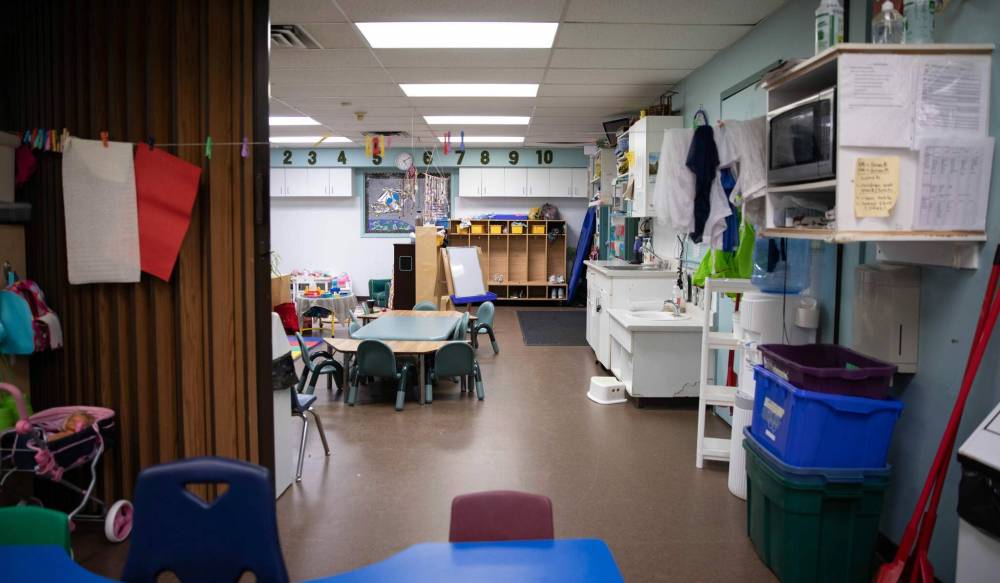Manitoba accused of ‘sleight of hand’ on child-care fees
Advertisement
Read this article for free:
or
Already have an account? Log in here »
To continue reading, please subscribe:
Monthly Digital Subscription
$19 $0 for the first 4 weeks*
- Enjoy unlimited reading on winnipegfreepress.com
- Read the E-Edition, our digital replica newspaper
- Access News Break, our award-winning app
- Play interactive puzzles
*No charge for 4 weeks then billed as $19 every four weeks (new subscribers and qualified returning subscribers only). Cancel anytime.
Read unlimited articles for free today:
or
Already have an account? Log in here »
Hey there, time traveller!
This article was published 28/11/2022 (514 days ago), so information in it may no longer be current.
Child care advocates say the Manitoba government hasn’t lived up to its promise of a 50 per cent reduction in fees by the end of this year.
There was much fanfare in August 2021 when Manitoba signed a federal-provincial agreement that was to provide parents across the country with regulated child care averaging $10 per day by 2025-26.
“The price of child care in Manitoba has not changed,” said Susan Prentice, a University of Manitoba professor and member of the Child Care Coalition of Manitoba, which is calling for the province to make good on its promise.

There was much fanfare in August 2021 when Manitoba signed a federal-provincial agreement that was to provide parents across the country with regulated child care averaging $10 per day by 2025-26. (Jessica Lee / Winnipeg Free Press files)
“Even under the Canada-wide plan, the child care fees today are the same as they were nine years ago: $20.80 per day for pre-school, $30 per day for infants in a not-for-profit facility,” said Jodie Kehl, executive director of the Manitoba Child Care Association.
Instead of reducing fees, Manitoba chose to index an “antiquated” subsidy scale, she said.
Manitoba is the only province that’s trying to get to $10-a-day care by relying on fee subsidies, Prentice said.
“It’s a big set of administrative burdens, all much more complicated than changing the price,” said Prentice.
A parent who receives a subsidy must justify why they need the subsidy, is always at risk of losing it, and has to go through “lots of hoops and red tape to prove they’re eligible, and that they continue to be eligible,” the professor said.
“It requires lots of red tape at the facility level, too, which every four weeks has to report specific data on the number of subsidized parents, and if the kids were there, and if they missed any time,” said Prentice. “Then it requires a bureaucracy to manage it.”
Other provinces — such as Alberta, B.C. and Ontario — have reduced fees, she said.
Alberta dropped the price to a flat fee of $25 a day that she said is still high, but marks a big reduction for that province.
“Over 12,000 parents in B.C. are just paying $10 a day,” said Prentice. “In Ontario, a number of facilities have signed on to the program, which will soon see them offering $10 a day.”
Manitoba is the only province that hasn’t changed its fee and is “exclusively trying to argue that the subsidy system is an adequate alternative to changing the price,” said Prentice who called it a “sleight of hand.”
Manitoba has kept the fees the same, but has made more parents eligible for a subsidy, meaning the average amount parents pay across the province has gone down.
“It’s like the average out-of-pocket costs have fallen for everybody, but the price of child care has not changed, and Manitoba is not announcing that it will reduce the fee for everybody and it has no plan for getting an actual cost of $10-a-day child care for our province,” she said.
Kehl, whose association didn’t endorse the media event at the legislature, said the out-of-pocket expense for some families has dropped, but it’s not the same as a fee reduction.
She explained that child-care providers have received a subsidy advance and were asked to encourage all families to apply for the subsidy.
“This, unfortunately, doesn’t support an equitable-for-all system,” Kehl said. There’s a “huge amount of red tape for families to apply.”
Providing a subsidy rather than reducing fees puts much of the administrative burden on families and can be a “very intrusive, stigmatizing process,” she said.
“Not all facilities told families to apply, so not all families benefited across the province,” said Kehl.
It has resulted in numerous problems, she said.
Recently, one centre told parents it had to use the remainder of its federal subsidy to reduce fees for families that qualified for the subsidy by Jan. 30, or it would lose it. It was providing credits for fees they had paid dating back to September.
“Why are we waiving all the fees at once instead of reducing fees to $10 a day over time?” the social media post asked.
Early Childhood Learning Minister Wayne Ewasko was not available for an interview Tuesday. In a prepared statement, he said Manitoba increased the income threshold for subsidies this year to ensure that those with lower incomes benefited as quickly as possible.
“The goal is to reduce fees for all parents to an average of $10 per day… We continue to collaborate with our sector and federal government on innovative ways to lower parents fees.”
carol.sanders@freepress.mb.ca

Carol Sanders
Legislature reporter
After 20 years of reporting on the growing diversity of people calling Manitoba home, Carol moved to the legislature bureau in early 2020.



